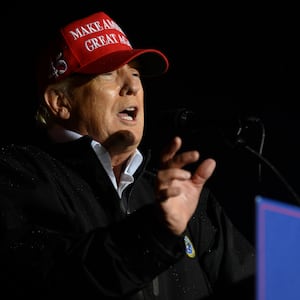The New York Attorney General is suing former President Donald Trump, his adult children, and their family real estate company, capping off a three-year investigation into what her investigators deemed rampant business and tax fraud.
The lawsuit, revealed at a press conference with New York AG Letitia James Wednesday morning, seeks to block the Trumps from serving as business executives and charge the Trump Organization with a whopping $250 million in fines.
The Trump Organization is also facing the corporate death penalty, as the AG is seeking to revoke its business license to keep it from ever operating in New York again.
The lawsuit also seeks to bar Trump from making any real estate deals or applying for any loan in New York, arguably the financial capital of the world—and the town where Trump built his business empire.
Perhaps most notably, the AG's office has also passed along evidence to federal prosecutors in Manhattan and the Internal Revenue Service “for criminal investigation."
“For too long, powerful, wealthy people in this country have operated as if the rules do not apply to them. Donald Trump stands out as among the most egregious examples of this misconduct,” James said.
From a podium in her office, James said investigators uncovered evidence that, for an entire decade ending in 2021, Trump “fraudulently inflated” the value of his real estate “by billions of dollars to unjustly enrich himself and to cheat the system—thereby cheating all of us.”
She said investigators relied on millions of pages of evidence, as well as the testimony of more than 65 witnesses. And the New York AG's office found that Trump personally certified financial statements that were blatant lies, opening himself up to criminal charges of bank fraud that she hopes the feds will pursue.
James pointed to the way Trump used “objectively false numbers” to calculate the value of his real estate, claiming at one point that his luxury Manhattan apartment was 30,000 square feet—tripling its actual size. She called it “intentional and deliberate fraud, not an honest mistake.” She also noted how Trump’s appraisers valued the neo-gothic tower at 40 Wall Street (just across the street from the AG’s office) at nearly $200 million, a number that Trump more than doubled the next year when he estimated it on official documents at $524 million—claiming that it was based on his appraiser’s figures.
The AG's suit demands some long-deferred accountability from the Trump Organization, which Trump used to propel himself to national fame in the 1980s and long touted as an example of his business acumen and financial success—an image that helped him win the presidency in 2016.
James opened her investigation in March 2019, shortly after one-time Trump right-hand attorney Michael Cohen gave Congress copies of old Trump financial statements, which he said reflected Trump’s underhanded tactics: lying about real estate values by either inflating them to qualify for better bank loans or deflating them to minimize real estate taxes.
Three small towns north of New York City received subpoenas, first made public by The Daily Beast, in which investigators probed how Trump had inflated the price of his forested estate to dodge taxes—an odd arrangement that involved wildly inflating the value of undeveloped land before setting it aside as a conservation site and taking a tax write-off. Investigators also explored how Trump simply made up non-existent real estate space at Trump Tower to jack up the value there, as well as financial games he played with a golf course that siphoned money away from a local public school system.
What would have remained a quiet investigation spilled out into the public view when one of Trump’s adult sons, Eric, refused to testify behind closed doors—forcing the AG’s office to seek help from a state judge in 2020.
Trump then got a bad draw: The case was assigned to Justice Arthur F. Engoron, a tough judge with an even tougher law clerk, Allison Greenfield, neither of whom is known to tolerate obstruction or delay.
In Sept. 2020, Eric Trump was ordered to show up to his deposition, where he remained quiet and pleaded the Fifth Amendment against self-incrimination more than 500 times.
In the year-plus that followed, the AG’s office had to return to the judge several times to force Trump and his company to comply with subpoenas. When Trump and two of his other adult kids, Don Jr. and Ivanka, refused to show up for their scheduled depositions, Engoron had to order them to show up in February. The Trumps stalled further by appealing the decision to the state’s First Department, where they lost again.
Meanwhile, Trump himself refused to turn over documents, prompting Engoron to slap him with $110,000 in fines. Trump then tried to delay even further by claiming that a third-party digital forensics company hired to gather evidence was only doing some of the job, annoying investigators and the judge. Trump eventually turned over the corporate records, but only after much prodding.
At one point, the Trumps tried to get a federal judge to intervene and call the whole thing off, a move that also bombed. Trump’s attorney in the case, Alina Habba, tried to cast the entire investigation as political persecution by a Democrat—adopting the same commentary she frequently uses on right-wing TV networks and employing it in the courtroom. For that, she was repeatedly castigated by the judge’s law clerk, Greenfield.
Tensions have run high. Over the summer, Habba’s own legal secretary quit, citing racial discrimination after she allegedly heard Habba scream about how much she hates “that Black bitch,” James. (That case she recently settled.)
But the fighting didn’t end there. Even when Trump finally relented, he still tried to relocate the official law enforcement interview back to his place by lying about supposed Secret Service security concerns, as The Daily Beast revealed. And when he did show up at the AG’s offices in the Financial District to sit across from James herself, he simply followed his son’s example and remained quiet—pleading the Fifth.
But his defiant resistance has cost him.
His longtime accountants, the firm Mazars USA, dropped him amid the growing public evidence that Trump had regularly lied on business forms. And his cadre of lawyers left him as his legal troubles mounted.
His allies have also felt the heat. The real estate company Cushman and Wakefield has come under scrutiny over the way its property appraisers went along with Trump’s fanciful valuations, sparking accusations from the judge that they broke the rules. That company also got hit with fines for initially refusing to turn over records as well.
On Wednesday, James said her office may still seek action against Cushman and Wakefield, citing an “ongoing investigation.”
Although this investigation remains a civil matter—meaning that Trump and his lieutenants face no prison time—it has provided evidence for a parallel criminal probe her office is conducting alongside the Manhattan District Attorney. That arrangement has drawn criticism over the way the AG’s office can gather evidence that feeds into a criminal probe without putting Trump in front of a grand jury, avoiding a bizarre New York court rule that would have given him total immunity from prosecution.
But that second investigation, which at first seemed like a guaranteed bottom-up takedown aimed at prosecuting Trump himself, completely fell apart when the new DA, Alvin Bragg Jr., thought it would be too risky to indict Trump. All that’s left is a recent plea deal for the Trump Organization’s ex-chief financial officer, Allen Weisselberg, and an upcoming criminal trial for the company itself.
But Weisselberg’s troubles won’t end there. James said her office will try to bar Weisselberg and the right-hand accountant Jeffrey S. McConney—who testified in the criminal case but made himself the fall guy—from working as finance executives in New York.









